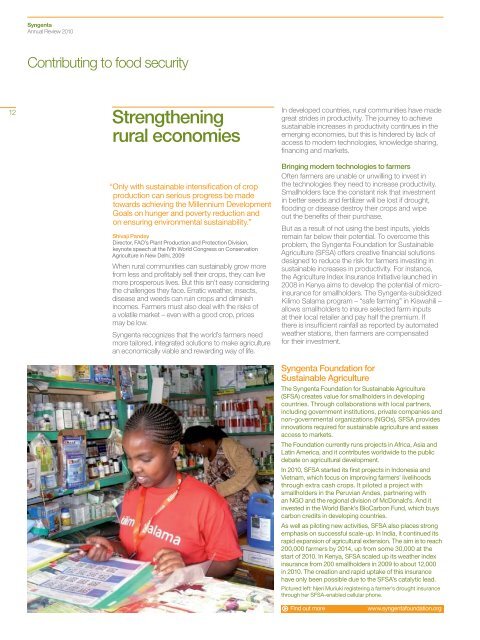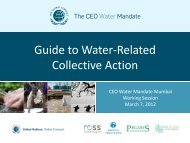Syngenta Annual Review 2010 - CEO Water Mandate
Syngenta Annual Review 2010 - CEO Water Mandate
Syngenta Annual Review 2010 - CEO Water Mandate
Create successful ePaper yourself
Turn your PDF publications into a flip-book with our unique Google optimized e-Paper software.
<strong>Syngenta</strong><br />
<strong>Annual</strong> <strong>Review</strong> <strong>2010</strong><br />
Contributing to food security<br />
12<br />
Strengthening<br />
rural economies<br />
“Only with sustainable intensification of crop<br />
production can serious progress be made<br />
towards achieving the Millennium Development<br />
Goals on hunger and poverty reduction and<br />
on ensuring environmental sustainability.”<br />
Shivaji Pandey<br />
Director, FAO’s Plant Production and Protection Division,<br />
keynote speech at the IVth World Congress on Conservation<br />
Agriculture in New Delhi, 2009<br />
When rural communities can sustainably grow more<br />
from less and profitably sell their crops, they can live<br />
more prosperous lives. But this isn’t easy considering<br />
the challenges they face. Erratic weather, insects,<br />
disease and weeds can ruin crops and diminish<br />
incomes. Farmers must also deal with the risks of<br />
a volatile market – even with a good crop, prices<br />
may be low.<br />
<strong>Syngenta</strong> recognizes that the world’s farmers need<br />
more tailored, integrated solutions to make agriculture<br />
an economically viable and rewarding way of life.<br />
In developed countries, rural communities have made<br />
great strides in productivity. The journey to achieve<br />
sustainable increases in productivity continues in the<br />
emerging economies, but this is hindered by lack of<br />
access to modern technologies, knowledge sharing,<br />
financing and markets.<br />
Bringing modern technologies to farmers<br />
Often farmers are unable or unwilling to invest in<br />
the technologies they need to increase productivity.<br />
Smallholders face the constant risk that investment<br />
in better seeds and fertilizer will be lost if drought,<br />
flooding or disease destroy their crops and wipe<br />
out the benefits of their purchase.<br />
But as a result of not using the best inputs, yields<br />
remain far below their potential. To overcome this<br />
problem, the <strong>Syngenta</strong> Foundation for Sustainable<br />
Agriculture (SFSA) offers creative financial solutions<br />
designed to reduce the risk for farmers investing in<br />
sustainable increases in productivity. For instance,<br />
the Agriculture Index Insurance Initiative launched in<br />
2008 in Kenya aims to develop the potential of microinsurance<br />
for smallholders. The <strong>Syngenta</strong>-subsidized<br />
Kilimo Salama program – “safe farming” in Kiswahili –<br />
allows smallholders to insure selected farm inputs<br />
at their local retailer and pay half the premium. If<br />
there is insufficient rainfall as reported by automated<br />
weather stations, then farmers are compensated<br />
for their investment.<br />
<strong>Syngenta</strong> Foundation for<br />
Sustainable Agriculture<br />
The <strong>Syngenta</strong> Foundation for Sustainable Agriculture<br />
(SFSA) creates value for smallholders in developing<br />
countries. Through collaborations with local partners,<br />
including government institutions, private companies and<br />
non-governmental organizations (NGOs), SFSA provides<br />
innovations required for sustainable agriculture and eases<br />
access to markets.<br />
The Foundation currently runs projects in Africa, Asia and<br />
Latin America, and it contributes worldwide to the public<br />
debate on agricultural development.<br />
In <strong>2010</strong>, SFSA started its first projects in Indonesia and<br />
Vietnam, which focus on improving farmers’ livelihoods<br />
through extra cash crops. It piloted a project with<br />
smallholders in the Peruvian Andes, partnering with<br />
an NGO and the regional division of McDonald’s. And it<br />
invested in the World Bank’s BioCarbon Fund, which buys<br />
carbon credits in developing countries.<br />
As well as piloting new activities, SFSA also places strong<br />
emphasis on successful scale-up. In India, it continued its<br />
rapid expansion of agricultural extension. The aim is to reach<br />
200,000 farmers by 2014, up from some 30,000 at the<br />
start of <strong>2010</strong>. In Kenya, SFSA scaled up its weather index<br />
insurance from 200 smallholders in 2009 to about 12,000<br />
in <strong>2010</strong>. The creation and rapid uptake of this insurance<br />
have only been possible due to the SFSA’s catalytic lead.<br />
Pictured left: Njeri Muriuki registering a farmer’s drought insurance<br />
through her SFSA-enabled cellular phone.<br />
Find out more<br />
www.syngentafoundation.org











